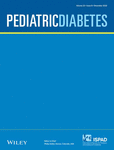Type 1 diabetes knowledge assessment: The KAT-1 validation study
Funding information: Clinical Innovation grant from the Children's Miracle Network at the University of Florida
Abstract
Objective
This study sought to examine the reliability and validity of a novel pediatric type 1 diabetes knowledge assessment (KAT-1) designed for children, adolescents, young adults and their parents/guardians. The instrument was designed to be integrated into the clinic workflow to obtain objective data electronically.
Research Design and Methods
KAT-1 was developed by a multidisciplinary team and includes 11 independent topical subscales. Forty children/caregivers participated in a pilot study; their feedback was used to improve item clarity and readability. Subsequently, a validation study was performed in 200 participants (100 children/adolescents/young adults with type 1 diabetes ages 11–21 years and 100 parents/guardians of children with type 1 diabetes ages 1–15 years) to examine correlations between the KAT-1 scores and Revised Diabetes Knowledge Test (DKT2) scores and HbA1c. An item analysis was conducted to determine internal consistency and reliability; topical subscales were evaluated using Cronbach's alpha.
Results
Total KAT-1 scores were positively correlated with DKT2 scores r = 0.674, p < 0.001, and negatively correlated with HbA1c, r = −0.3, p < 0.001. All KAT-1 subscales were positively and significantly correlated with one another and with total KAT-1 score. Internal consistency of total KAT-1 score was strong (Cronbach's α = 0.938, mean score 84.6, SD = 16.1) and 9 of 11 independent topical subscales demonstrated strong internal consistency. Completion time for subscales was <5 min.
Conclusions
KAT-1 is a valid instrument to assess type 1 diabetes knowledge. The instrument's short topical subscales can be used to objectively assess specific knowledge and individualize diabetes education. KAT-1 has been integrated into our electronic health record (EPIC) and is available online at no cost.
CONFLICT OF INTEREST
The authors report no relevant conflicts of interest.
Open Research
DATA AVAILABILITY STATEMENT
The data that support the findings of this study are available from the corresponding author upon reasonable request.




